#melancholic temperament
Explore tagged Tumblr posts
Text
Ahhh I love it! Well done!!


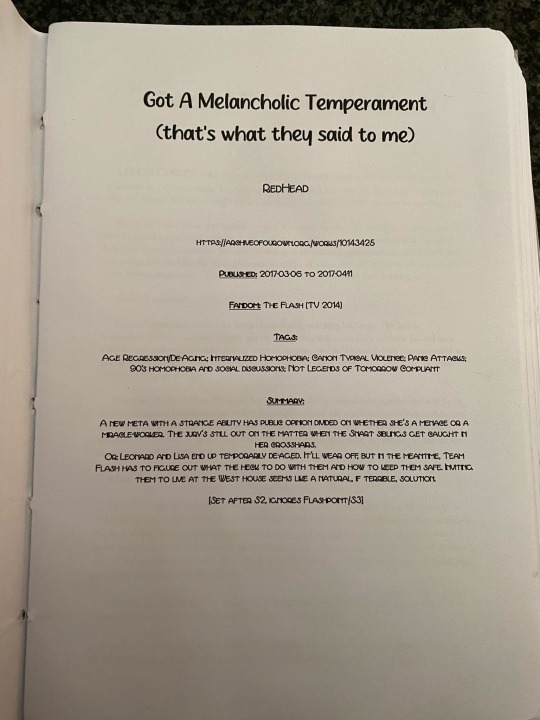

So I finally finished it! My hand bound copy of Got A Melancholic Temperament (that’s what they said to me) by @coldtomyflash (aka RedHead on ao3).
It’s not perfect, I messed up on the inside spine a little bit, but I’m really happy with how the cover and the little window for the title came out.
#it's so cool when people print and/or bind copies of my fics#i love seeing pics like this#well done :D#very cool#melancholic temperament
56 notes
·
View notes
Text
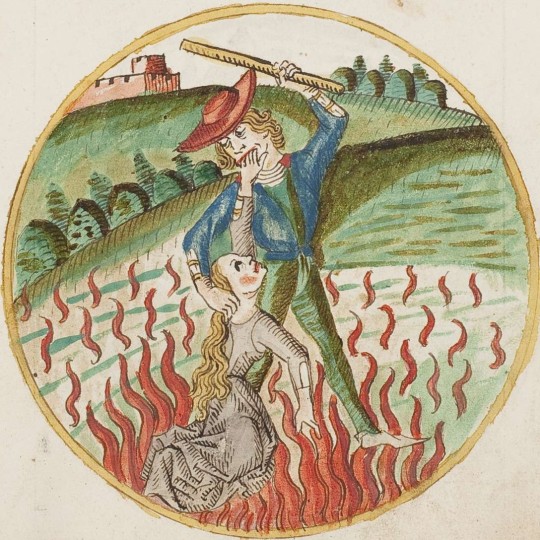

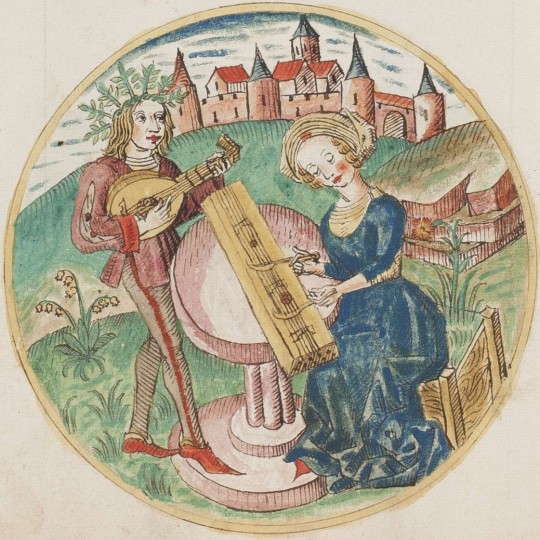

the four temperaments: choleric, sanguine, phlegmatic, melancholic
in an astrological-astronomical miscellany, alemmanic german, c. 1500
source: Wolfenbüttel, Herzog August Bibliothek, Cod. Guelf. 8.7 Aug. 4º, fol. 125r-126v
#tbh the phlegmatics are having a better time than i would've thought#four temperaments#15th century#sanguine#choleric#melancholic#phlegmatic#humourism#illuminated manuscript#medieval art#musical instruments
763 notes
·
View notes
Text
(song used: Bling-Bang-Bang-Born by Creepy Nuts)
Made an intro for a show that doesn't exist.
.....for characters that I just pulled out of my head.

Meet, from left to right... Phil, Sunny, Cole, and Melanie!
They are based off the four humors, which, back in ye olden days, were a personality classification system that was based on how much of something you have in your body.
Blood, Yellow Bile, Black Bile, and Phlem.
Sanguine people are super happy and outgoing, Choleric people are super angry and trigger happy, Phlegmatic people are chill and carefree, and Melancholic are pessimistic and anxious.
And I turned that into four, simple marketable characters that would've totally existed in the 2000s.
#my art#original characters#original character#four humors#four temperaments#sanguine#choleric#phlegmatic#melancholic#Phlegmatic Phil#Sanguine Sunny#Choleric Cole#Melancholic Melanie#oc#ocs#animation#artists on tumblr
8 notes
·
View notes
Text
The nature of Venus
The reasonings behind the temperaments of the planets
My boyfriend had an epiphany about Venus's temperament and he gave me permission to write about it as he doesn't intend to. He's not an astrologer, he learns a lot of astrology from me and as a Venusian he was baffled to know that some astrologers understood Venus as a sanguine planet. This is at least what Ptolemy says and he is just the most influential astrologer in history. This got personal when we did his own temperament calculations and learned that he can be either phlegmatic or sanguine depending on what you consider Venus to be (he's clearly very phlegmatic). As a Libra, the ambiguity was torturous. My boyfriend is convinced that Venus is phlegmatic and not even Ptolemy's authority will convince him otherwise. I don't know if traditional astrologers think about this or are aware of what I'm about to explain, but I myself have never seen any astrologer talking about that and pointing out the pattern he saw, so I think it's worth sharing.
He was just learning about the temperaments of the planets and he was questioning why Jupiter, for example, has domicile in Sagittarius and Pisces, which are choleric and phlegmatic respectively, if Jupiter is a sanguine planet? And why does Mars have a domicile that corresponds to his choleric temperament and then another in a phlegmatic sign? It didn't make sense to him, since the Hellenistics seem to love symmetry very much. The sudden lack of symmetry was unacceptable. To him, everything had to have a pattern and logic, and I think he found them and was able to make a very good defense of the phlegmatic Venus, and I made some developments to it.
The Thema Mundi
For credibility in hellenistic astrology you have to justify things using the Thema Mundi, so if you're not familiar with what that is, this other post by @saturniandevil will help. When we study the Thema Mundi, we say we put the Sun in Leo first, because that's the height of the mythic summer, the Moon stays behind it in Cancer, because things have to start with the luminaries and the Moon is best represented in its phlegmatic phase when it's waning, when it's behind the Sun. The Sun has to see the other planets on its right, while the Moon sees them on its left, of course. And then the planets are arranged in Chaldean order from fastest, Mercury, sitting next to the lights in his role of assisting power, to slowest, Saturn, opposing them.
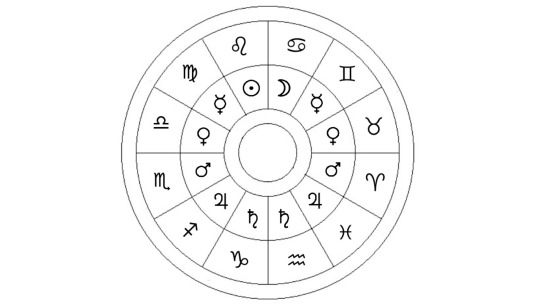
If you notice you'll see that the Sun and the Moon have temperaments that correspond to their domicile signs. The Sun is hot and dry, as is Leo, the Moon is cold and humid, as is Cancer. Next comes Mercury, the dual planet that is either melancholic or sanguine depending on its phase, cold and dry when it's after the Sun, and hot and humid when it's before the Sun, as illustrated below. It has domicile in Virgo and Gemini, which are melancholic and sanguine. If it stopped here everything would be already perfect, the Sun, the Moon, Mercury number one and Mercury number two cover all 4 temperaments and make sense in their domiciles.

But things have to change when we get to the malefics and benefics, because they don't work in the same way, because they're not supposed to. They're also 4 planets and in their scheme we have to consider that malefics are malefics because they're considered to be extreme, and benefics are benefics because they're considered moderate; this is one of the few consensus in astrology. Mars is considered mostly too hot and it has one domicile with the same temperament, Aries. And Saturn, considered mostly too dry, has one domicile in Capricorn. Because they're extreme, naturally they should have domicile signs compatible with their natures and other ones that are of the complete opposite nature as theirs. Choleric (hot and dry) is the antithesis of phlegmatic (cold and humid), and melancholic (cold and dry) is the antithesis of sanguine (hot and humid). The fixed water sign is considered the main house of Mars traditionally, while the fixed air sign is considered the main house of Saturn, signs where their natures are alien. This highlights even more their extreme natures, they're either here or way over there.
But benefics are considered moderate, temperate, so it makes sense that their houses correspond to only one of their lords' primary qualities individually. They are always in the same quality of either temperature or humidity when in domicile, never both and never neither. Jupiter as a hot and humid planet has domicile in Sagittarius because that's a hot sign that isn't humid, and in Pisces because it's humid without being hot. They don't need to be in domicile in a place that is of the same nature as them, just one that has one of their primary qualities.
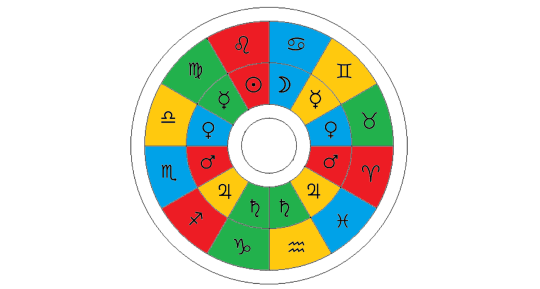
This scheme is also more interesting, because it makes the malefic and benefic of the same sect have opposing natures. Jupiter is hot and humid, contrasting the malefic cold and dry nature of Saturn. Venus is cold and humid, contrasting Mars' hotness and dryness. If Venus is considered sanguine the entire scheme collapses. This is why Venus is phlegmatic in our opinion.
The Ptolemaic view
But why does Ptolemy say Venus is sanguine? Or what do I think is his reason? As we all know, Ptolemy created the geocentric system that defined astrology for centuries and continues to be a reference. Here's what he says about Venus's nature:
Venus has the same powers and tempered nature as Jupiter, but acts in the opposite way; for she warms moderately because of her nearness to the sun, but chiefly humidifies, like the moon, because of the amount of her own light and because she appropriates the exhalations from the moist atmosphere surrounding the earth. (Ptolemy, Tetrabiblos Book I chapter 4)

He gave astronomical rationales for everything, including for the primary qualities of the planets, using his own cosmogony. He's giving his astronomical reasons based on his geocentric system he's created, he's not the one worried about symmetry in this. He gives the nature of the planets based on their distance from the Sun, or from the Earth or Saturn, or based on them being in between two specific other planets etc. And there's nothing wrong with that, of course. He implies he's taking from "the ancients" the idea that Jupiter and Venus are both sanguine (Tetrabiblos, Book I chapter 5), he's following his teachers, he's not building everything from the ground up, obviously, so Ptolemy himself might not have even noticed how a sanguine Venus is the only loose end breaking a pattern. I'm not all against breaking rules, but if we use the Thema Mundi as a reference for everything in Hellenistic astrology, and we use it to justify criticism of modern rulerships, with the argument that those who use them don't know the rules to be breaking them, then I think we could see sanguine Venus in the same light.
part II - More on the temperament of the planets
#venus#hellenistic astrology#traditional astrology#ptolemy#thema mundi#temperaments#primary qualities#choleric#sanguine#phlegmatic#melancholic
33 notes
·
View notes
Text


11 notes
·
View notes
Text
Me, trying to write a sanguine: What would Chester Arthur do?
#the brainstorming of the arateph rapunzel retelling has me musing over camreth's character again (which has always been tough to nail down)#i've always known he had a very strong sanguine temperament#but as an introvert with a heavy melancholic streak i had a tough time wrapping my head around it#specifically how to reconcile his cheerfulness with his intense survivor's guilt#and today i was reminded of chester arthur and the fact that he was a sanguine#and it was super helpful actually#the guy dealt with some devastating losses (specifically his wife)#he had big emotions (i think camreth would have better self-control)#but then he'd just keep doing things and making friends and distracting himself#i'm also expanding camreth's character by considering some scarlet pimpernel and robin hood connections#he's not just a terrified fugitive hiding from all eyes#he's got a bit of a con artist side#a touch of the trickster#a friendliness that can charm people so they don't question him too closely#perhaps some joy in the art of disguise#which is helpful as i try to imagine how he survives when he's not inside zemma's tower#but the chester arthur connection is the funniest and most out-of-the-blue#adventures in writing#arateph
7 notes
·
View notes
Text
Temperament Test


Your temperament is:
81.26% introverted, 62.5% neurotic
#Temperament#Test#Temperament TestYour temperament is:81.26% introverted#62.5% neurotic#Melancholic#Intoverted#Personality#Personality test#Personality quiz
13 notes
·
View notes
Text
I've literally never seen a good word said about so4s
#typology#enneagram#saying this as a so4#we're by far the least desired 4 subtype 💀#which is funny cus i think that knowledge makes us worse#sometimes i look at all my typings and im like damn ive been dealt terrible cards#melancholic-choleric and readind abt how melancholic temperament is almost always considered the worst#as if it were a sickness
5 notes
·
View notes
Text
unsatisfied with the blog theme again
#okay not really#i really like the spy organization esque theme i have in mind#but istfg i keep thinking that it could he BETTER#this is the melancholic side of my temperaments acting up /hj#looking at what i have in mind in terms of what fandoms to write for (historical/fantastical) I might as well craft a theme based on that
2 notes
·
View notes
Text
I really have to reconsider my temperament huh.
(Context: We done a personality test in youth service haha)
#mvtique#I’m phlegmatic melancholic again#but in a healthy way haha#phlegmatic#melancholic#phlegmatic melancholic#temperament
4 notes
·
View notes
Text
Temperaments: Physical Appearance (AI-Generated)
Choleric (Fire)
Thin and angular body
Reddish or yellowish complexion
Piercing, intense eyes
Thin and dry lips
Pointed, angular features
Thin, wiry hair
Tendency to sweat profusely


Sanguine (Air)
Robust and muscular body
Ruddy complexion
Large, expressive eyes
Red and full lips
Rounded, fleshy face
Thick, curly hair
Tendency to perspire easily


Phlegmatic (Water)
Plump and round body
Pale, moist complexion
Large, soft eyes
Thick and flabby lips
Rounded features
Thick, wavy hair
Tendency towards oily skin and hair


Melancholic (Earth)
Thin and bony body
Pale complexion
Deep-set, serious eyes
Thin and compressed lips
High forehead
Thin, straight hair
Tendency towards dry skin and hair


#hippocrates#four temperaments#ai#physical appearance#visual identification#personality#psychology#choleric#sanguine#phlegmatic#melancholic
20 notes
·
View notes
Text







2 notes
·
View notes
Text
not a smoker so i just take melancholy breaks at work
9 notes
·
View notes
Text
More on the temperaments of the planets
This is a continuation of the post "The nature of Venus - The reasonings behind the temperaments of the planets". On this post I'll demonstrate further how we can see a pattern in the temperaments using the Thema Mundi, and how the orientality or occidentality of the signs seem to be relevant to understand the temperament of the planets. If you haven't read the previous post you won't fully understand this one, so please go there and then come back here.

We can almost split the chart vertically in the middle to see the oriental planets on the right and the occidental on the left. As I explained in the last post, oriental Mercury (which rises just before the Sun) appears on its sanguine house, Gemini, while occidental Mercury (which appears after the Sun sets) is on its melancholic house of Virgo. I believe that could be why Hellenistic astrologers all associate Mercury with these two temperaments in this way.
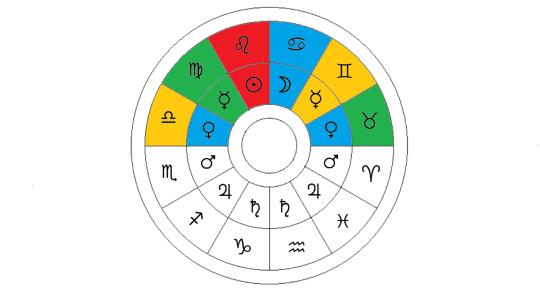
If we expand a bit of that logic to Venus, we see that as an oriental planet it is cold two times, by being a phlegmatic planet in the melancholic sign of Taurus. On the occidental side, its humidity is emphasized by the sign of Libra. Venus is a nocturnal planet, so its most important quality, humidity, is emphasized in the occidental/nocturnal sign to the Sun. This means we can give some special importance to Libra as a venusian sign, which could be one of the reasons why some like to associate Venus with the sanguine temperament. And as I wrote in the last post, because Venus is a benefic, we see it have domiciles that correspond to only one of its primary qualities.
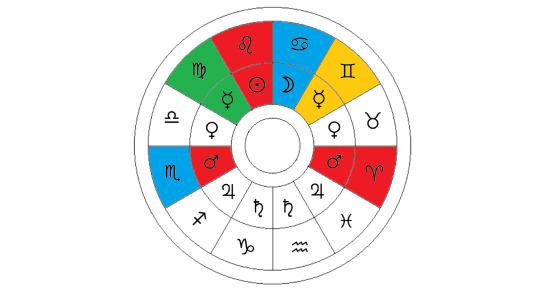
Mars comes right after Venus, and as an oriental planet, it's at the extreme of its choleric temperament in the sign of Aries. But as an ocidental/nocturnal planet, its inflamed nature is contrasted with the water sign of Scorpio.
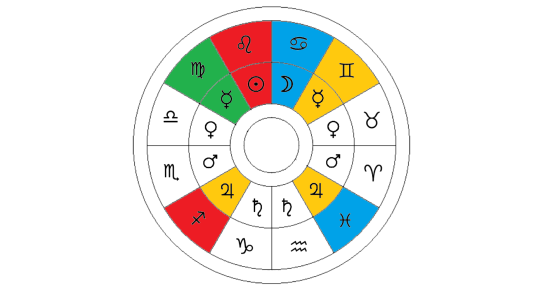
Then comes Jupiter, the diurnal benefic, which on the oriental side has its humidity emphasized by the sign of Pisces. As an ocidental planet, its warm quality is more emphasized by Sagittarius. In Tetrabiblos book I chapter 4, Ptolemy says Jupiter's most important quality is actually its warmth, which "produces fertilizing breezes", but here we can get a different idea.
On a side note, it's interesting that a lot of writers will say that the planets, as they have two houses, they are more powerful in one by day and in the other by night. Obviously, they say the day houses are the oriental ones seen here and the night houses are the occidental ones. Except for Sagittarius and Pisces, which trade places, and I have no idea why.

(49 footnote in Tetrabiblos, book I chapter 20 ebook - translated by J.M. Ashmand)
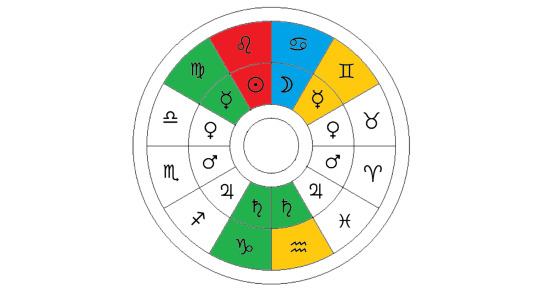
Now, Saturn is very cold and dry, opposing Cancer's humidity and coldness perfectly. Capricorn is its most ocidental/nocturnal place, where its manifestation is its most cliché. On the oriental side, Aquarius contrasts its temperament with humidity and heat.
I'm not either implying that Saturn is more malefic in Capricorn and Mars is more malefic in Aries, and neither that Venus is more benefic in Libra and Jupiter in Pisces. I don't think that, and I talked here before about how this idea, for example, that Aries is more war-like, or more malefic, than Scorpio, is not backed by tradition that much. And in my experience, signs and dignity are not the first thing that define the degree of maleficence or beneficence of a planet, if they even do that. Dignity means the planet has responsability over the place, that's why it's able to rule there. I don't believe Scorpio dials down Mars' power, otherwise it wouldn't be its domicile, it wouldn't be represented by the most dangerous and armed animal in the zodiac. Signs are not malefic, because they're not actors, they're costumes. The planets are the actors and they can be malefic or benefic in various costumes. The costumes of their domiciles have more to do with the action they're doing, they'll be able to act in their most classic and conventional manner in their own signs. Even the idea of detriment wasn't that big of a deal for a time in Hellenistic astrology and the maleficence and beneficence of planets weren't really determined by the signs they were in, and I believe forgetting about the association of good and bad to domicile and detriment is a good exercise. I believe in emphasizing more phase, luminosity, sect, the relationship with other planets and houses, with fixed stars etc, and even then, associating "good" or "bad" to planets in astrology can get very controversial, but I'm not going to get into this right now.
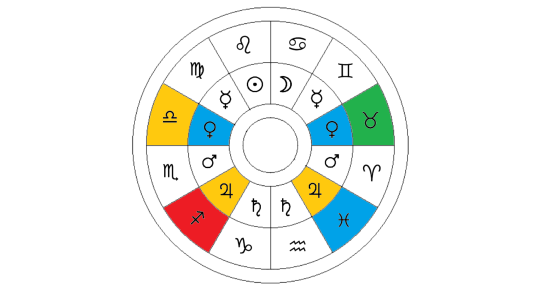
You can also notice how the humid quality is predominant in the benefics, Venus and Jupiter. What changes between the two is their temperature, Jupiter is warm because it's of the day sect, Venus is cold because it's of the night sect. So, dryness shows up in Sagittarius, the ocidental/nocturnal sign of Jupiter, because Jupiter isn't nocturnal; and in Taurus, the oriental/diurnal sign of Venus, contrary to its nocturnal nature. But even with that, a lot of (mostly medieval) astrologers believed the main house of Venus was Taurus and the "main house" of Jupiter was Sagittarius, so it could be that this "main house" wasn't the same thing and wasn't decided by looking at their position in the Thema Mundi. Or, it could be that the rationale was that they were moderate, so their main house shouldn't be the one that's most like them, I don't know. I do understand that is controversial to say that Pisces is more like Jupiter than Sagittarius, and that Libra is more like Venus than Taurus, but remember that what I'm taking into account is their temperament, which is modulated by their position in relation to the Sun. And in the Thema Mundi, this looks to be a pattern that starts with Mercury, being sanguine in its oriental sign, and melancholic in its occidental sign, but the rest of the planets aren't dual like Mercury.

With the malefics, the hot one is put in the night sect and occidental side and the cold malefic is put in the day/oriental side, to contrabalance. The dry quality is the more predominant and the contrast of their signs of opposite temperaments is on their humidity. This reminds us of what "benefic" or "malefic" are supposed to mean, which is propensity or not to life, fertility or infertility, determined by humidity or dryness. Water creates life and without water there's no life, no generation, no expansion. I would say that the malefics are more capable of being generative in their humid signs, which can be seen in how Mars and Scorpio, for example, have associations with seeding and the seeding season especially in mesopotamian astrology. Such a dead thing like a seed if watered can generate life. And Saturn and Aquarius, the water bearer, gets associated with agriculture in general.
#temperaments#hellenistic astrology#ptolemy#traditional astrology#choleric#sanguine#phlegmatic#melancholic#venus#thema mundi
20 notes
·
View notes
Text
The Four Temperaments of Personality

Hey Tumblr peeps! 🌈✨ Today, let's take a whimsical dive into the ancient world of personality theories. I'm talking about the Four Temperaments, an idea that dates back to the days of Galen, a Greek physician. It’s like astrology but vintage and medical. So, grab your time machine (or just your imagination) and let’s go back to ancient times! 🚀🏛️
First off, Galen was this super smart dude in ancient Greece who believed that our personalities were influenced by bodily fluids (stay with me, it’s less gross than it sounds). He proposed four main temperaments: Sanguine, Choleric, Melancholic, and Phlegmatic. Sounds like a wizarding school from Harry Potter, right? 🧙♂️✨
Sanguine (The Social Butterfly): Think of your friend who’s always the life of the party. Sanguine peeps are super sociable, charismatic, and love adventures. They’re like human sparklers – bright, bubbly, and always up for fun. If Sanguine was a meme, it would be a cat chasing a laser pointer – endlessly energetic and playful. 😸🎉
Choleric (The Born Leader): Here come the bosses! Choleric individuals are all about ambition and getting things done. They’re natural leaders, super confident, and maybe a bit stubborn. Think of a superhero who’s always saving the day, but maybe doesn’t really listen to their sidekick’s advice. 🦸♂️🌪️
Melancholic (The Thoughtful Dreamer): Deep, thoughtful, and a bit of a perfectionist, Melancholic people are the ones lost in their journals or painting in a cozy corner. They’re sensitive, artistic, and maybe a little moody. Imagine a rainy day with a cup of tea and a good book ��� that’s total Melancholic vibes. 🌧️📚
Phlegmatic (The Chill Peacemaker): Chill, calm, and totally collected. Phlegmatic individuals are the peacekeepers, the ones who keep cool in a crisis. They’re reliable and kind, like a rock in a stormy sea. If Phlegmatic were an animal, they’d definitely be a chill cat napping in the sun. 😌🌞
Now, let’s be real, we’re all a mix of these temperaments depending on the day (or the hour). But it’s fun to think about which one you might lean towards. Are you the party-starter Sanguine, bossy Choleric, dreamy Melancholic, or chill Phlegmatic? Or a little bit of everything?
Remember, this is ancient stuff – we’ve come a long way in understanding personality since Galen’s time. But it’s still cool to explore these old ideas and see how people way back then tried to make sense of the human psyche. 🧠🌟
So, which temperament do you vibe with? Or are you a unique blend of ancient personality magic? Share your thoughts and let’s chat about it! 💬✨
#Four Temperaments#Personality Time Travel#Galen Gang#Galen#Greek#personality#sanguine#choleric#phlegmatic#melancholic
2 notes
·
View notes
Video
youtube
you feel lonely in a world full of people (a classical playlist)
#music queue#all these pieces are joyful and full of love when I hear them#some are the pinnacle of Romance#my heart feels triumphant#my soul feels peacefull#is it because I have context for them?#or that lonely isn't sadness?#or that I am temperament melancholic#and Choleric
2 notes
·
View notes